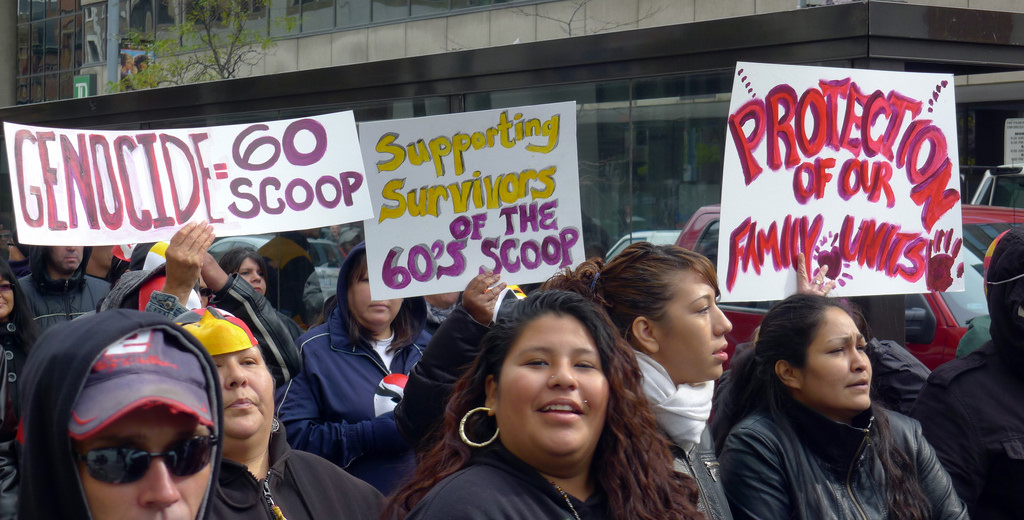The term “Sixties Scoop” refers to the large numbers of Indigenous children who were taken from their homes (scooped) throughout the 1960s. Most of these children were adopted by non-Indigenous families in Canada and the United States. The “Sixties Scoop” has left a lasting legacy on the children, families and communities involved.
This article is a plain-language summary of Sixties Scoop. If you are interested in reading about this topic in more depth, please see our full-length entry, Sixties Scoop.

The “Scooping” of Indigenous Children, 1951 – 1980s
Patrick Johnston created the term “Sixties Scoop.” He was a researcher. He used the term for a report he wrote in 1983. It is entitled Native Children and the Welfare System. The report recounts the “scooping” of Indigenous children on a massive scale. Often, the parents did not agree with their children being taken away from them. This was a result of Canada trying to assimilate Indigenous peoples. It was not because Indigenous peoples were bad parents.
The “scooping” started in 1951. It originated in changes made to the Indian Act. These changes allowed provinces to get involved in the welfare of Indigenous children. Poverty was widespread on reserves and within Indigenous communities in Canada because of colonization. In addition, there was high death rates and many other problems. Indigenous peoples in Canada did not have the services or resources they needed. Neither the federal government nor the provincial governments helped much. Instead of providing help to these communities and the children, the provincial governments simply took them from their homes. This policy was seen to be a quick and easy solution.
By law, social workers did not have to ask for the permission of parents to take the children away. They did not have to ask the communities either. Between 11,000 to 20,000 children were adopted between 1960 and 1990. Many of these children were from the Prairies. Saskatchewan and Manitoba were particularly involved in the “Sixties Scoop.” Many of the children were adopted by American families. Some children were even sent outside of North America. Some went to New Zealand.
Changes to Policies
The Johnson Report and calls from Indigenous communities resulted in changes. To begin, the relatives of the children in need and Indigenous families were given first priority for adoption. Indigenous families were also considered before non-Indigenous families for Indigenous child adoption. In 1990, more changes were made. The federal government created a program to help change take place. It was called the First Nations Child and Family Services program (FNCFS). One very important change was that local bands were given more authority. Now, bands have even more authority. There are still many problems though. A large percentage of Indigenous children are still in the child welfare system. Over 50% of children in foster care are Indigenous children.
Impacts
Many of the children were negatively affected. They were lost and lonely. They could not learn about Indigenous identity and culture. Although many adopting families were loving and kind, some were abusive. Some children reported physical, sexual and other abuse. In sum, it was a very difficult experience for many of the children who were “scooped.”
Apologies and Settlements
In 2015, Manitoba apologized. The Truth and Reconciliation Commission (TRC) stated that the Sixties Scoop was a part of a cultural genocide. In 2009, some of the adoptees sued the federal government. The Ontario Superior Court ruled in their favor. As a result, in 2017 the federal government said it would settle the claim for $800 million dollars. In 2018, the Alberta government apologized too. Before this, survivors in Alberta were given platforms to tell their stories. About 575 did so. Saskatchewan apologized in 2019. The Sixties Scoop Healing Foundation helps survivors heal. It announced a permanent board of directors in 2020.

 Share on Facebook
Share on Facebook Share on X
Share on X Share by Email
Share by Email Share on Google Classroom
Share on Google Classroom